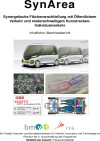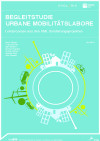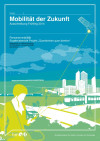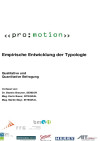Projektberichte
Es wurden 6 Einträge gefunden.
SynArea – Synergetic area coverage by public transport and low-threshold short trip-private transport

The aim of the project is the coverage of rural and/or suburban regions with multimodal services, which are more attractive for customers and economically more efficient than conventional public transport, accessed by foot, bike&ride or park&ride, and at the same time ecologically and socially more sustainable, than the sole use of motorised individual transport.
Harald Buschbacher, Gerald Kelz, Edith Hartmann, Stefan Kirschbichler, Christian Obermayer
Herausgeber: BMVIT
Deutsch, 232 Seiten
Downloads zur Publikation
MobLab Study – Begleitstudie zur Vorbereitung urbaner Mobilitätslabore

The MobLab Study supports the exploration of emerging urban mobility laboratories in Austria, in order to reduce the gap between the research results of the rigid environment of a laboratory and the implementation practice by offering a targeted accompanying of new Living Labs as user centred innovation settings as well as an evaluation of the gained insights.
Martin Berger, Linda Dörrzapf, Gert Breitfuß, Michael Poglitsch, Andrea Stickler, Vanessa Sodl, Elias Remele
Herausgeber: BMVIT
Deutsch, 53 Seiten
Downloads zur Publikation
Querdenken quer denken - Creative Thinking on Crazy Ideas

The project “Querdenken quer denken” (Creative Thinking on Crazy Ideas) includes, besides a scientific support for the projects that receive the support in the currently open call for person’s mobility, an analysis of whether and to what extent existing financial instruments consider ideas, concepts, and implementation as well as perspective that reaches beyond the borders of specialized disciplines.
Ao.Univ.Prof. Mag. Dr. Günter Emberger, DI Ulrich Leth , Mag. Susanne Wolf-Eberl, Odilo Seisser
Herausgeber: BMVIT
Deutsch, 97 Seiten
Downloads zur Publikation
pro:motion - Topology report

In pro:motion, methods from social sciences are applied in order to identify homogeneous groups of shared mobility-related information needs and to extract appropriate group-related arguments (e.g. health, environment, costs, image, adventure) in order to create incentives for active mobility.
Dr. Beatrix Brauner, Mag. Karin Bauer, Mag. Martin Mayr
Herausgeber: BMVIT
Deutsch, 113 Seiten
Downloads zur Publikation
The Drive to Walk: Identifying Milieu-based Persuasion Strategies for Motivating Active Mobility

11th International Conference on Persuasive Technology (Persuasive Technology 2016), Workshop Empowering Cities for Sustainable Wellbeing, Salzburg, Austria
Millonig, A., Markvica, K., Haufe, N.
Herausgeber: Springer - Verlag Berlin Heidelberg 2011
Englisch, 11 Seiten
Downloads zur Publikation
WIFAS - The Assessment of social impacts of funding programmes that support research in the mobility of people and goods

The aim of the WIFAS study is to develop a conceptually and empirically sound model to capture the social effects and/or impacts caused by subsidy programmes –Thus, by working out appropriated indicators and by conceiving a rating system which is suitable fort he analysis of a variety of impact dimensions, with special emphasis on ecological effects.
Mag. Peter Kaufmann, Laurenz Wolf, MSc, Mag. Alex Schubert, Dr. Alexander Neumann
Herausgeber: BMVIT
Deutsch, 154 Seiten
